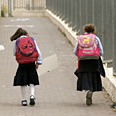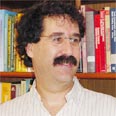
Increasing number of haredi students (archive)
Photo: Dudi Vaaknin

Public schools in decline
Photo: CD Bank

Prof. Dan Ben-David
Study: Arab, haredi schools growing in number
With new school year starting this week, independent research institute publishes report showing that public schools system shrank by 9% in last decade, while Arab and ultra-Orthodox schools make up close to 50% of student population. 'Education in these sectors must be improved drastically and immediately,' warn researchers
The public schools system is growing weaker, and very soon Israel's classrooms will be filled with students from the Arab and haredi sectors, according to a forecast published Sunday by the Taub Center for Social Policy Studies in Israel.
In honor of the new school year, which begins Tuesday, the Taub Center published statistics Sunday showing rapid demographic change in Israel's schools within the last year. According to the center, these change necessitate an urgent change in the Education Ministry's policies and a concentrated effort to develop basic skills for working in a modern economy and an open society.
Hatikva
Yaheli Moran Zelikovich
In interview with Ynet just days before school year opens, Gideon Sa'ar outlines his plans for addressing deep problems within education system. On the agenda: Harsher disciplinary enforcement, strengthening connection to Zionist heritage. Arab Monitoring Committee: His motives political
The study, based on Education Ministry statistics, shows that 46% of students studied in public schools in 2000, while only 39% of students study in public schools in 2009. The Arab-haredi bloc represented only 39% of students and now stands at 48% such that every third child in Israel studies in the Arab or ultra-Orthodox system. The number of students studying in national religious schools remained practically the same.
"Israel's character has changed drastically within the last decade, and the Education Ministry must start planning accordingly," said Taub Center Executive Director Prof. Dan Ben-David. "The level of education that the future majority – Arab Israelis and haredim – is receiving is significantly lower than Western standards. This has far-reaching consequences on the future of the country."
The decreased hegemonic status of the public school track can also be seen in absolute terms. It is the only track that decreased in its number of students in the past nine years with a drop of 3%. Simultaneously, the number of students studying in the ultra-Orthodox track jumped by 51%. The number of students learning in the Arab track grew by 10%. The national religious system saw an increase of 8% in its student body since 2000.
In light of these changes, the Taub Center recommends that the government focus on developing a designated curriculum for the populations who will represent a majority of Israeli classrooms in another generation with a concentrated effort on developing basic skills for working in a modern economic and in a developed society.
Prof. Ben-David believes that Arab and ultra-Orthodox students do not receive the basic skills that would allow them to contend in the international arena. "In comparison with the 25 OECD countries who participated in the 2006 PISA assessment exams, which test the most important core subjects – math, science, and reading – the average performance of the Jewish population are at the bottom of the list. The performance of Arab Israelis was even worse."
Approaching the point of no return
According to Ben-David, "The grades of Arab-Israeli students were lower by 14% than the Israeli average. Haredi students didn't even participate in the exam. No other country omitted such a large part of its population from the international exams, while no state-wide curriculum is enforced in the haredi sector."
"One of the problematic implications of the study is on the Israeli job market," the report concluded. "The levels of employment among Arabs and haredim are significantly lower than what is accepted in developed countries, and their average salary is lower as well. In this context, the Education Ministry is said to have a significant role in establishing the levels of employment and salaries of its graduates."
According to the center, the level of education provided as of today to these two groups indicates "a socio-economic path that will not be sustainable in the future."
"A government that does not drastically improve the education system in the very near future by putting particular and significant emphasis on improving the quality of education provided to these two educational sectors will bring the country closer to the point from which it will not be possible to change the direction of the existential implications of such," concluded the Taub Center.
The Taub Center for Social Policy Studies in Israel defines itself as "an independent, non-partisan, socioeconomic research institute."















